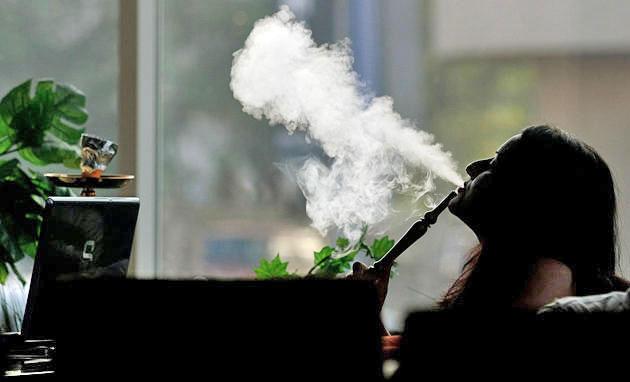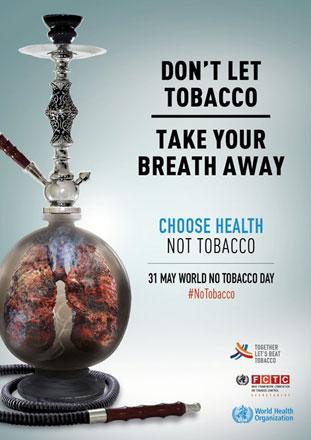You are here
Health Ministry, UN urge ‘unity’ to end tobacco use
By JT - May 30,2018 - Last updated at May 30,2018

Tobacco is responsible for 12 per cent of all deaths among people over 30 years of age in Jordan (Petra photo)
AMMAN — On the occasion of thie year's World No Tobacco Day, which focuses on “Tobacco and Heart Disease”, the Ministry of Health and the United Nations in Jordan have called upon the government, UN agencies, academics, media, the private sector and civil society groups, to unite to end tobacco use and its "devastating consequences", a joint statement said.
"Tobacco use in Jordan is a public health emergency. It is a major driver of poor health and premature mortality," the statement read, stressing that tobacco use is "a considerable threat to the economic and sustainable development of Jordan".
One in two adult men smoke cigarettes while one in two adults and youth is exposed to second-hand smoke.
One in eight deaths is attributable to tobacco use in the Kingdom, which is much worse than the global statistic of one in ten deaths, the statement pointed out, adding that the latest evidence showed that tobacco is responsible for 12 per cent of all deaths among people over 30 years of age in Jordan. Within this group, tobacco imposes the largest death burden on respiratory diseases (34 per cent of all deaths), cancers (18 per cent) and cardiovascular diseases (13 per cent). These numbers are on the rise since tobacco is a key risk factor for the development of coronary heart disease, stroke and peripheral vascular disease.
All forms of tobacco use are harmful, including cigarettes, argileh (hookah) and new electronic tobacco products such as heated tobacco products, e-cigarettes or vapes, as tobacco is inherently toxic and contains carcinogens even in its natural form, regardless of whether it is heated, burned or consumed in any other form, according to the statement.
"In recent years, the consumption of hookah has increased at an alarming rate among youth and women. Sadly, electronic tobacco products are also becoming the new trend," the statement read.
Because these products contain nicotine and their use is initiated during adolescence (24 per cent of youth use tobacco products), actions to prevent Jordan’s youth from a potential lifetime of nicotine addiction are critical.
However, large sections of the public have misconceptions about tobacco products and do not realise that, for instance, one hour of hookah consumption equals smoking 100 cigarettes and that emerging electronic products are harmful and addictive as well.
In 2004, Jordan became one of the first countries in the world to ratify the World Health Organisation Framework Convention on Tobacco Control (WHO FCTC), a legally binding international treaty. Following this ratification, Jordan made a great achievement in developing its Tobacco Control Law as part of Public Health Law #47 in 2008 with further amendments in 2017, the statement noted.
In 2016, the Prime Minister endorsed the National Tobacco Control Strategy followed by the implementation of its roadmap.
The political commitment demonstrated should be sustained by taking all possible actions and making every effort to control tobacco use and raising public awareness of the harm of its use in all forms.
The statement outlined a number of recommendations to help reduce tobacco-use and consequently make significant progress in reaching the Sustainable Development Goals (SDGs).
First, it called for all public places (including private businesses) to be 100 per cent smoke-free environments, with no exceptions; it warned against advertising, promotion, sponsorship and corporate social responsibility activities by the tobacco industry and its front groups and asked for them to be banned.
Furthermore, it called for tobacco warnings to at least meet the WHO FCTC requirements, and called on the WHO FCTC Protocol on Illicit Trade of tobacco products to be ratified.
On the World No Tobacco Day, marked annually on May 31, the government of Jordan together with the UN in Jordan stated their responsibility to help overcome the alarming tobacco epidemic that threatens economic growth, sustainable development and the lives of millions of men, women and children in Jordan.
Related Articles
AMMAN — Tobacco products and electronic nicotine delivery devices (ENDs) are sold openly in stores located near schools in Jordan, according
AMMAN — Under the patronage of HRH Princess Dina Mired, the Ministry of Health, jointly with the World Health Organisation, on Thursday laun
A growing number of teens and young adults are using hookah, or water pipes, and many of them may be under the mistaken impression that it i


















